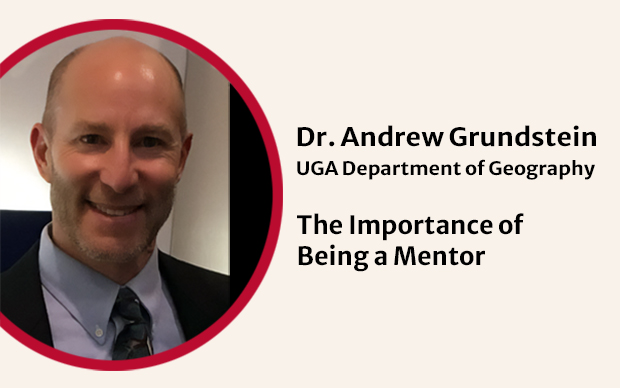Written by the UGA Graduate School
Interview with Dr. Andrew Grundstein, PhD / Professor and Graduate Coordinator in UGA’s Franklin College of Arts and Sciences Department of Geography
Mentorship is a cooperative relationship that can be an enriching experience for both graduate students and those who mentor them. Graduate faculty frequently serve as mentors by supporting graduate students through academic advising, training in research or scholarship, and/or professional development.
The Graduate School encourages faculty to engage in best practices in graduate advising and mentoring, forming connections with students that can have a lifelong impact on their success throughout their graduate education and into their careers.
Dr. Andrew Grundstein, Professor and Graduate Coordinator in UGA’s Franklin College of Arts and Sciences Department of Geography, has been trained in the CIMER Entering Mentoring curriculum and has led trainings for UGA faculty in order to promote strong and supportive graduate mentoring on campus. Dr. Grundstein shared some insights from his experience mentoring graduate students and training other graduate mentors.

What makes a good mentor?
I think there are a lot of qualities that can make for a good mentor. The most important one to me is that you have the best interest of your mentee in mind. Good mentors also see the relationship as interactive and evolving.
What do you enjoy about your faculty mentor role?
One of the things I enjoy the most about mentoring is getting to see my mentees grow and achieve their goals. An interesting and challenging aspect of mentoring is that you interact with so many different people with different personalities, goals, and backgrounds. I’m always learning to help support my mentees.
I’ve been really lucky in my own experiences as a mentee, and it’s nice to give back. It’s also rewarding to see mentees accomplish their goals over time, graduate, and move into great careers.
Tell us about learning to be a better mentor.
Most of us have never had any training in mentoring. I’ve learned about mentoring from several different sources. I was very lucky to have a wonderful advisor/mentor in graduate school and to have colleagues who are outstanding mentors who I am constantly learning from. I also learn about mentoring through reading articles, training sessions, and from the experience of mentoring itself. It’s an ongoing process.
What are some tips for establishing a strong mentoring relationship?
I think establishing good communication and an understanding of each person’s expectations early on is really important. This sets the tone moving forward.
What is your department doing to set faculty up for success, therefore setting students up for success?
We try to foster good communication between mentors and mentees. One way we do this is to ask all of our incoming students to complete mentor/mentee compacts and individual development plans with their advisors. We hope this fosters healthy discussions about the mentor/mentee relationship and puts a focus on how to help the mentees reach their goals.
